China Brands, Marketing & Consumers
BMW Ice Cream Gate: Three Reasons Why a MINI Story Became a Major Incident
There is more behind the BMW MINI ice cream incident than ice cream alone.
Published
1 year agoon
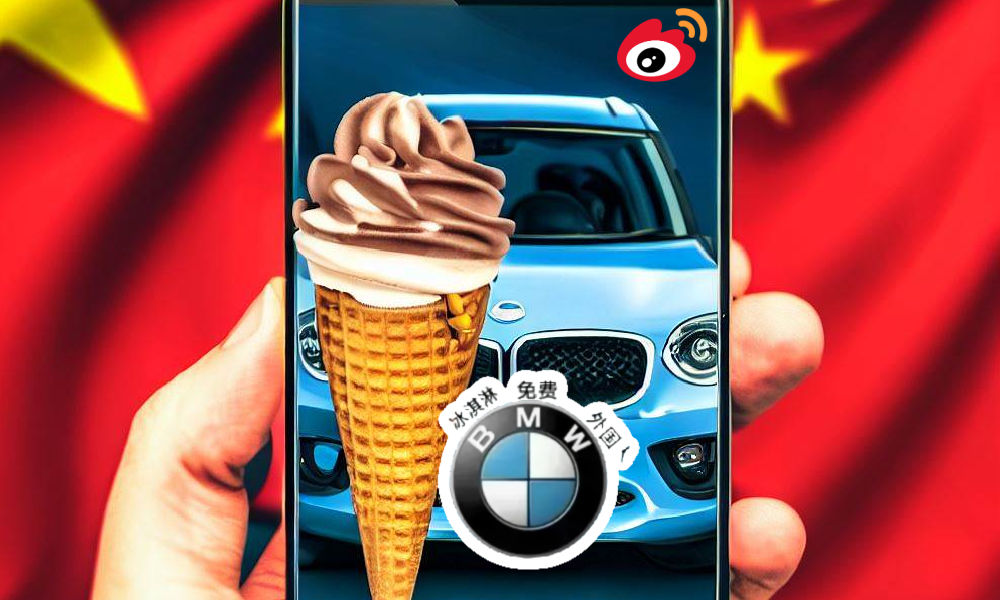
The Shanghai Auto Show’s BMW MINI booth and its employees found themselves at the center of a social media storm after a video of their free ice cream promotional campaign made it seem like foreigners got free ice cream while Chinese visitors were told no. The incident has had a major impact, both online and offline. What caused a seemingly minor event to escalate into a significant controversy?
It is the noteworthy incident that made international headlines over the past week: a freebie marketing campaign by German automotive company BMW at the Shanghai Auto Show went horribly wrong.
The incident happened on April 20, 2023, at the Shanghai show’s MINI booth, where two Chinese female workers were giving out free ice cream from a local brand.
A video was posted on Chinese video platforms Bilibili and Douyin that showed staff at the booth refusing ice cream to a local visitor by stating that it had all been given away. However, when a foreign attendee approached, the staff suddenly had ice cream readily available for them.
The person who was filming, a Chinese man named Sun, then stepped up to the booth and ask for ice cream himself. The girls then suggested an app was needed for that, and that they had limited supplies. The video further showed that the only people actually enjoying the Luneurs brand ice cream were all foreigners.
The video footage soon went viral and sparked public outrage over discrimination against Chinese visitors of the show.
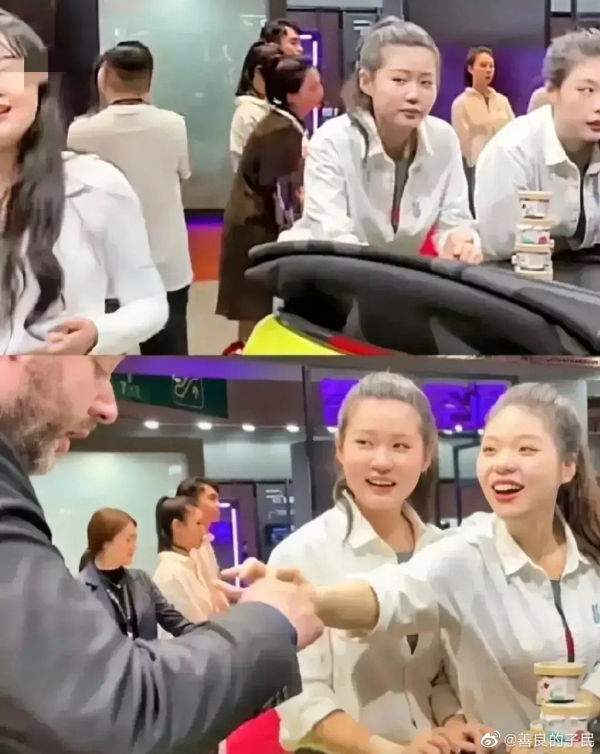
Screenshots from the video showed employees ignoring Chinese visitors and giving foreigners icecream (via Weibo).
BMW MINI tried to avert a marketing disaster by issuing an official apology via its social media channels in China on the same day, stating that they regretted that their sweet promotional campaign caused unhappiness “due to the lack of internal management and staff negligence.”

Many people, however, thought the apology was insufficient. “ChatGPT could write [a better apology] than this,” a typical comment said, and some even gave examples of ChatGPT writing a better apology.
“If I can speak English can I have some ice cream?”, another popular comment said. Others said they would never consider buying BMW again.
On April 21, BMW MINI released another statement on its Weibo account, in which they indicated that they had given away 600 ice creams in two days for people coming to the booth with vouchers distributed via the MINI app. At the booth, they had also set aside a few ice creams for their own “very hard-working colleagues” at the show. The statement said that the foreigners in the video were all BMW colleagues, wearing a badge.
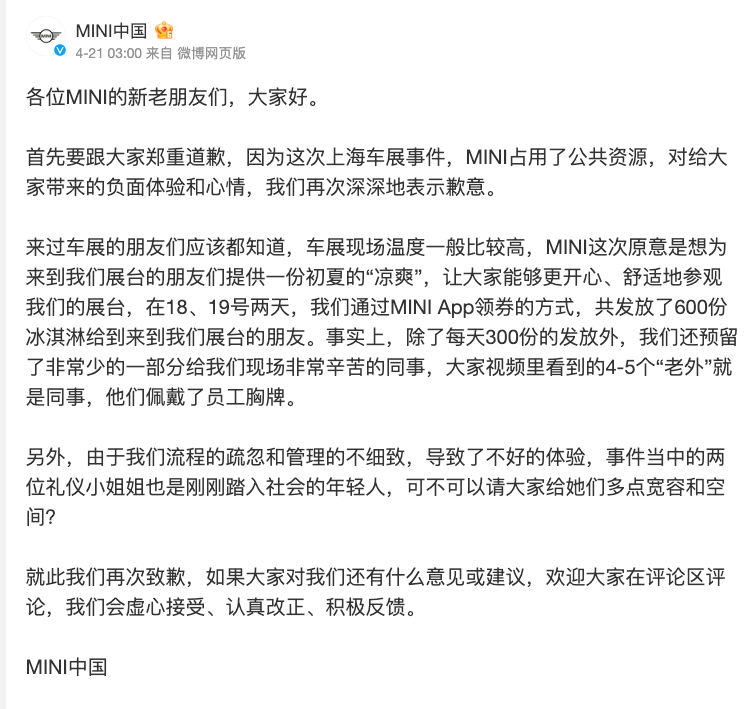
They again apologized for the controversy and admitted they had mismanaged the situation, adding that they hope that people can have some tolerance and space for the two female workers who are young and were just newly employed.
The two female employees were reportedly dismissed and the ice cream promotional campaign was stopped (#宝马mini两名发冰淇淋女生已离职#). “You should replace your PR team,” some people suggested.
The controversy further intensified when news came out that, also on Thursday, one female live blogging at the BMW MINI booth was sent away and removed by security.
How could ice creams at an auto show trigger such heated nationwide discussions? There are multiple factors, including historical, societal, marketing, and online media dynamics, that contributed to the incident becoming such a significant issue.
1. Painful History: “No Dogs and Chinese Allowed”
One of the reasons why the BMW MINI story triggered such sharp criticism, accusations of racism, and emotional reactions, is because the incident stirs up collective memories of a sensitive period in history when Chinese faced humiliation and discrimination by the hands of foreign powers.
In discussions on the BMW MINI ice cream incident, the phrase “Chinese and Dogs Not Admitted” (“华人与狗不得入内”) came up again and again in online comments and memes.
The phrase is widely remembered in the context of a sign in front of Shanghai’s Huangpu Park that was closed to Chinese people in the late 19th and early 20th centuries during the International Settlement. The fact that the ice cream incident took place in Shanghai further reinforced the connection to this local history.

The “No Dogs and Chinese Allowed” sentence, by the way, was never actually displayed as an official sign at the park gate. But there was still a regulation at some point that Chinese visitors, except servants, were not allowed in the park. Bicycles and dogs were also not allowed in the park. Eventually, “No Dogs and Chinese Allowed” turned into a symbol of the nation’s “historical humiliation” (Bickers & Wasserstrom 1995: 446-449).
The sign was also featured in the Bruce Lee film Fist of Fury, and one relevant scene in the film was also shared on Weibo in light of the BMW MINI controversy (watch the scene here).
Because the (imagined) Huangpu sign has left such a lasting imprint on the collective memory of the Chinese public, it comes back up in online discussions whenever there are viral incidents in which Chinese people are made to feel unequal to foreigners in any way.
“So many years have passed, yet still fundamentally there is still [the idea] that foreigners are above us,” one commenter wrote. Others spoke of “BMW’s ‘Chinese and dogs not allowed’ attitude,” and one article called the BMW ice cream incident the 21st century version of “Chinese and dogs not allowed” (“宝马mini冰淇淋事件,是21世纪的“华人与狗不得入内“).

Multiple online discussions associate the BMW ice cream incident with the history of Chinese not being allowed to enter public parks during foreign occupation.
In 2018, Chinese bike-sharing service Ofo received massive criticism when it was exposed that they would give foreigners their deposits back while Chinese customers were ignored. One news headline about special tourist trains for Chinese tourists in Switzerland also triggered controversy in 2015.
When various foreign countries imposed Covid-related travel restrictions only for passengers from China in January of 2023, many netizens also responded with resentment and anger, partly fuelled by Chinese media reports describing the rules as a form of foreign revenge, discrimination against the Chinese, and political conspiracy.
2. Consumer Nationalism amd Western Brands
Another reason why the Shanghai Auto Show incident received so much attention relates to the specific dynamics of consumer nationalism in China and the BMW brand reputation.
One type of nationalism that has become especially prevalent on Chinese social media in recent years involves online anger Chinese netizens demonstrate toward Western brands. This goes hand in hand with a shift in consumer sentiments, a growing popularity of made-in-China brands along with a rise in cultural nationalism and changing international dynamics (read more).
In July of 2022, the French luxury fashion house Dior came under fire after netizens discovered one of its skirts resembled a Chinese traditional skirt known as mǎmiànqún (马面裙). The brand did not acknowledge that it had used the Chinese traditional design and online anger grew, with many netizens accusing Dior of cultural appropriation (read here).
Western brands faced heavy criticism in China in 2021 when a social media storm erupted over the Better Cotton Initiative (BCI) and its brand members for no longer sourcing from China’s Xinjiang region. The ‘Xinjiang cotton ban’ led to a major ‘Xinjiang cotton support’ campaign on Weibo, and a boycott for those brands siding with BCI (read here).
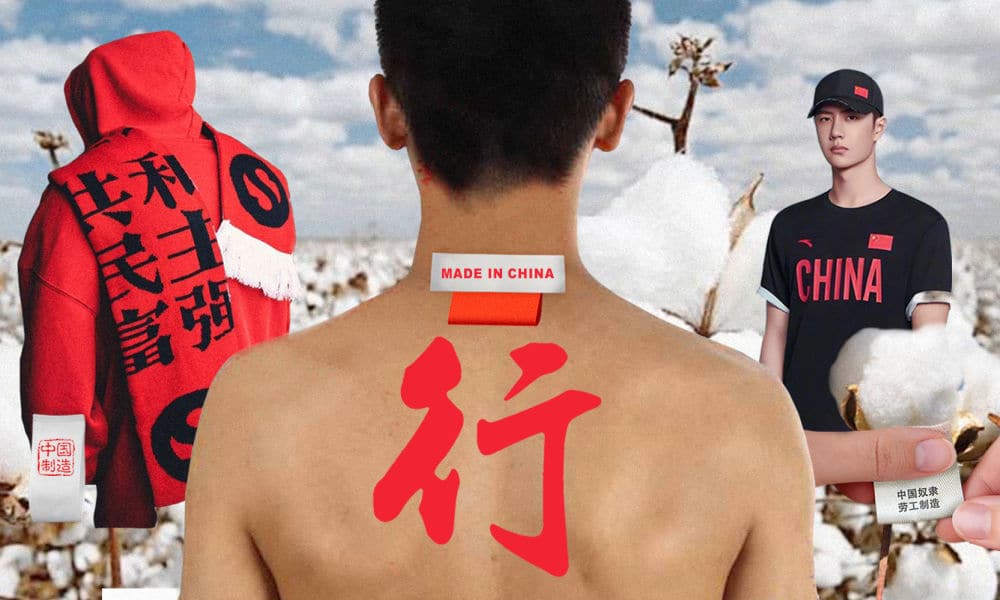
Image “Chinese fashion first: consumer nationalism and ‘China Chic’, by Ami/Goethe, see article here.
Condemnation and boycotting of Western brands also became prevalent during the Hong Kong protests in 2019, when Chinese social media users and state media condemned foreign brands for showing any signs of disregarding the One-China Policy. Asics, Calvin Klein, Coach, Givenchy, Versace, Swarovksi, and others were blamed for not respecting China’s sovereignty by listing Hong Kong and Taiwan as different countries on their websites or other products (read here).
In 2018, Italian fashion house D&G got caught up in a major controversy when its promo video campaign came under fire. In of their videos, a Chinese female model clumsily attempted to eat a large cannoli bread with chopsticks; a voice-over said that the cannoli might be “too big” for her. It was not received very well by many netizens on Chinese social media, where people called it “outdated and stereotypical,” “racist,” and “disrespectful.” The controversy snowballed out of control from there and became much worse after screenshots of racist comments attributed to fashion designer Stefano Gabba went viral (read here).
The recent BMW incident is thus part of a larger pattern of Western brands being accused of insulting and disrespecting Chinese people, while the popularity of Chinese (car) brands is rising. Earlier this month, What’s on Weibo wrote an article about how BMW often makes headlines in China in the context of horrific hit-and-run incidents and how the negative headlines are impacting BMW’s brand image in China.
BMW’s negative brand reputation in China exacerbates the impact of the ice cream incident, rather than alleviating it.
Although the brand has had a positive image for its high-quality and luxurious cars, it has also received a lot of unfavorable publicity, creating more negative associations – BMW drivers are generally seen as materialstic and flaunting their wealth. The nationwide attention for the ice cream incident and BMW MINI’s response to it has further damaged the brand’s reputation. The BMW stocks saw a price dip following the incident.
For some BMW car owners, the incident has also had negative consequences. According to various social media posts and photos, some BMW MINI owners saw their cars being scratched or vandalized over the past few days. At least one BMW MINI owner saw ice cream smeared over the front of their car.
3. The Snowball Effect of Social Media Storms
The incident involving BMW sparked a massive online controversy on Chinese social media, which quickly gained momentum. Initially triggered by one single video, it rapidly spiraled out of control as thousands of netizens joined in, expressing their views and creating their own videos and memes (also see this Twitter thread).
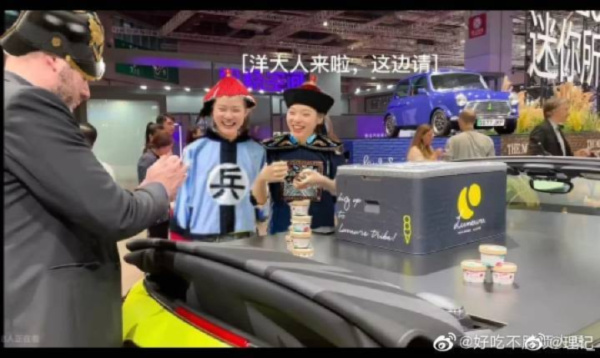
Some social media users also used old cartoons ridiculing preferential treatment for foreigners.
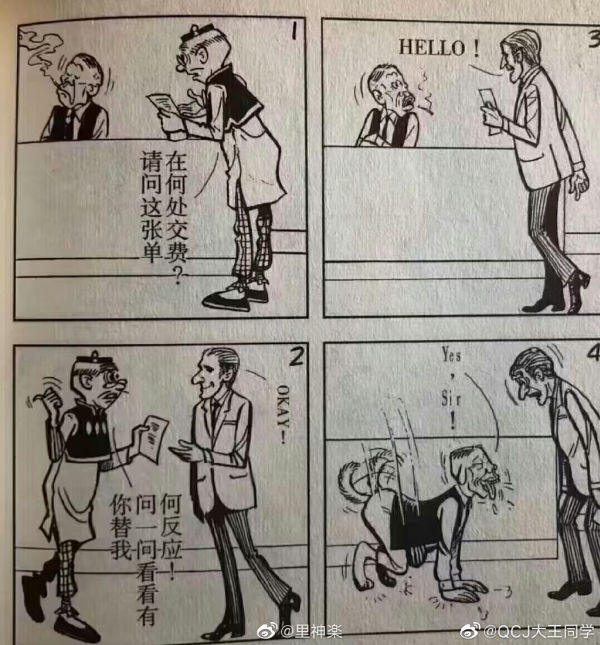
“Classic cartoon never goes out of date” (via Weibo/QCJ大王同学).
One meme suggested that “BMW” stands for: Bīngqílín (冰淇淋, Ice cream), Miǎnfèi (免费, Free), and Wàiguórén (外国人, Foreigners).
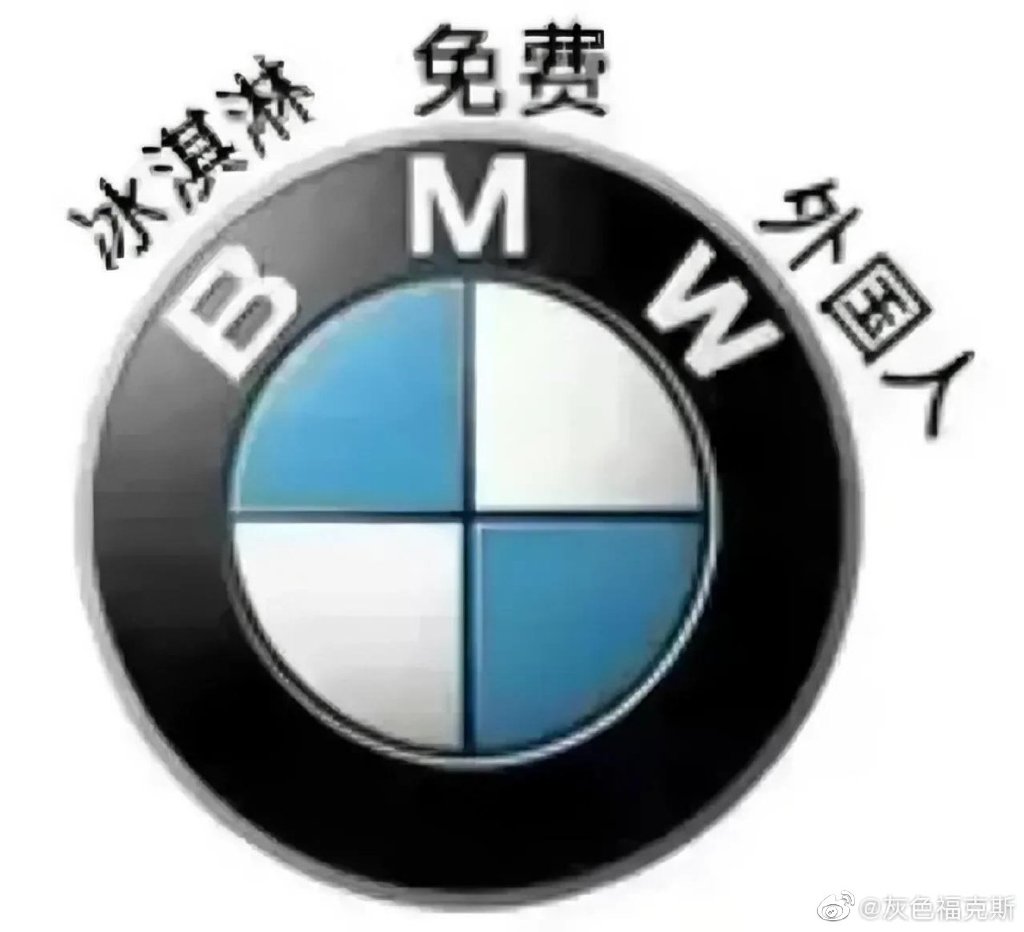
Besides general social media users, major brands also played a role in hyping up the incident. Other brands and companies used the firestorm to their advantage. Audi, for example, announced via social media that they would also be handing out ice cream only for Chinese people and other brands also started their own ice cream campaigns.

Chinese media outlets also played a major role in the incident as they kept reporting about the incident and promoted it on social media. By now, there are dozens of Weibo hashtags surrounding the incident and its aftermath, and the majority of them are initiated by Chinese media channels.
Chinese state media accounts also jabbed at BMW. CCTV aired an item showing that there is plenty of ice cream for all staff members on board of the Shandong PLA Navy aircraft carrier. Xinhua News even turned it into a hashtag, accompanied by a laughing emoji (#山东舰今天的冰淇淋是草莓味的#).
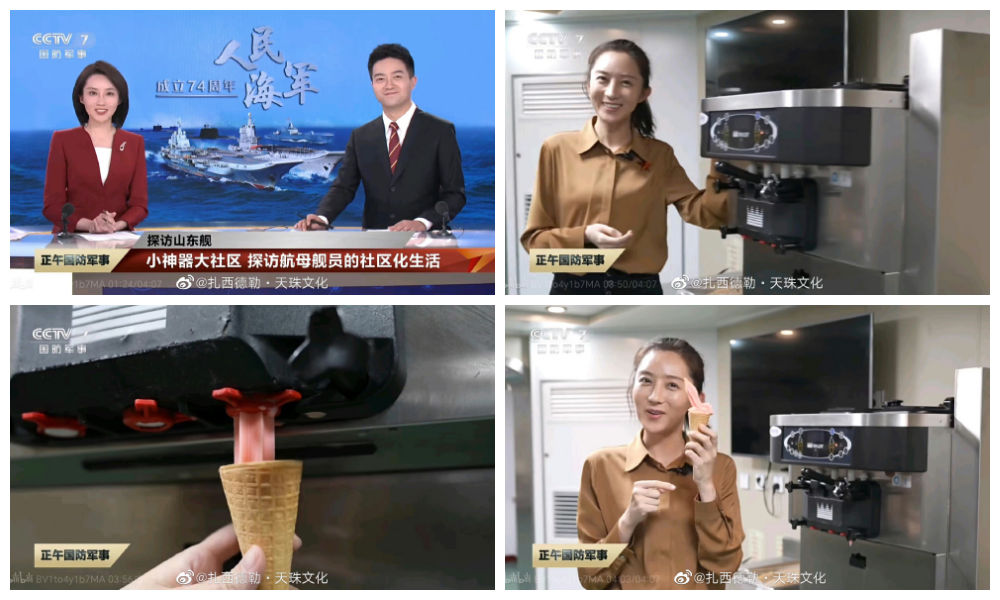
Screenshots from CCTV.
“We won’t give it to other countries,” some commenters joked: “Only Chinese can eat it.”
Meanwhile, some big KOL and influencer acounts also helped to attract more attention to the case by discussing it. Chinese political commentator Hu Xijin (@胡锡进), for example, also analyzed the incident. Although Hu called on netizens to be reasonable and have some understanding for the ordinary people who suddenly find themselves at the center of a social media storm, the mere fact that Hu brought the incident up multiple times to his 25 million Weibo followers perhaps did not exactly help in quieting things down.
For now, it seems that the BMW incident might keep fermenting for some time to come. While everyone is still talking about the ice cream incident, a second marketing faux-pas has already come up again as the next promotional freebie given away to visitors at the Shanghai Auto Show BMW booth is a wooden dog-shaped key hanger, giving people the option to engrave their name on it.
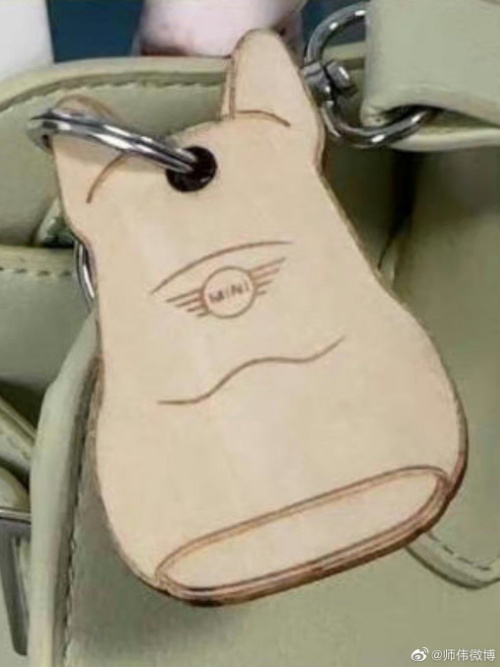
Many people also had an issue with this promo campaign: “So first they won’t give us ice cream, now they’re handing out dog tags with our name on it?”
Despite the controversy, many people still lined up at the BMW booth to get their freebies. The online discussions on the issue only seemed to bring more people to the car show. Turns out that bad publicity, after all, is still publicity.
Read more BMW-related articles here.
By Manya Koetse, with contributions by Miranda Barnes
Follow @whatsonweibo
Get the story behind the hashtag. Subscribe to What’s on Weibo here to receive our newsletter and get access to our latest articles:
References
Bickers, Robert A., and Jeffrey N. Wasserstrom. 1995. “Shanghai’s ‘Dogs and Chinese Not Admitted’ Sign: Legend, History and Contemporary Symbol.” The China Quarterly 142: pp. 444–66. JSTOR, http://www.jstor.org/stable/655423. Accessed 24 Apr. 2023.
Image
Part of featured image by Mae Mu on Unsplash
Spotted a mistake or want to add something? Please let us know in comments below or email us. First-time commenters, please be patient – we will have to manually approve your comment before it appears.
©2023 Whatsonweibo. All rights reserved. Do not reproduce our content without permission – you can contact us at info@whatsonweibo.com.
Manya Koetse is the founder and editor-in-chief of whatsonweibo.com. She is a writer, public speaker, and researcher (Sinologist, MPhil) on social trends, digital developments, and new media in an ever-changing China, with a focus on Chinese society, pop culture, and gender issues. She shares her love for hotpot on hotpotambassador.com. Contact at manya@whatsonweibo.com, or follow on Twitter.

China Brands, Marketing & Consumers
A Brew of Controversy: Lu Xun and LELECHA’s ‘Smoky’ Oolong Tea
Chinese tea brand LELECHA faced backlash for using the iconic literary figure Lu Xun to promote their “Smoky Oolong” milk tea, sparking controversy over the exploitation of his legacy.
Published
2 weeks agoon
May 3, 2024
It seemed like such a good idea. For this year’s World Book Day, Chinese tea brand LELECHA (乐乐茶) put a spotlight on Lu Xun (鲁迅, 1881-1936), one of the most celebrated Chinese authors the 20th century and turned him into the the ‘brand ambassador’ of their special new “Smoky Oolong” (烟腔乌龙) milk tea.
LELECHA is a Chinese chain specializing in new-style tea beverages, including bubble tea and fruit tea. It debuted in Shanghai in 2016, and since then, it has expanded rapidly, opening dozens of new stores not only in Shanghai but also in other major cities across China.
Starting on April 23, not only did the LELECHA ‘Smoky Oolong” paper cups feature Lu Xun’s portrait, but also other promotional materials by LELECHA, such as menus and paper bags, accompanied by the slogan: “Old Smoky Oolong, New Youth” (“老烟腔,新青年”). The marketing campaign was a joint collaboration between LELECHA and publishing house Yilin Press.

Lu Xun featured on LELECHA products, image via Netease.
The slogan “Old Smoky Oolong, New Youth” is a play on the Chinese magazine ‘New Youth’ or ‘La Jeunesse’ (新青年), the influential literary magazine in which Lu’s famous short story, “Diary of a Madman,” was published in 1918.
The design of the tea featuring Lu Xun’s image, its colors, and painting style also pay homage to the era in which Lu Xun rose to prominence.
Lu Xun (pen name of Zhou Shuren) was a leading figure within China’s May Fourth Movement. The May Fourth Movement (1915-24) is also referred to as the Chinese Enlightenment or the Chinese Renaissance. It was the cultural revolution brought about by the political demonstrations on the fourth of May 1919 when citizens and students in Beijing paraded the streets to protest decisions made at the post-World War I Versailles Conference and called for the destruction of traditional culture[1].
In this historical context, Lu Xun emerged as a significant cultural figure, renowned for his critical and enlightened perspectives on Chinese society.
To this day, Lu Xun remains a highly respected figure. In the post-Mao era, some critics felt that Lu Xun was actually revered a bit too much, and called for efforts to ‘demystify’ him. In 1979, for example, writer Mao Dun called for a halt to the movement to turn Lu Xun into “a god-like figure”[2].
Perhaps LELECHA’s marketing team figured they could not go wrong by creating a milk tea product around China’s beloved Lu Xun. But for various reasons, the marketing campaign backfired, landing LELECHA in hot water. The topic went trending on Chinese social media, where many criticized the tea company.
Commodification of ‘Marxist’ Lu Xun
The first issue with LELECHA’s Lu Xun campaign is a legal one. It seems the tea chain used Lu Xun’s portrait without permission. Zhou Lingfei, Lu Xun’s great-grandson and president of the Lu Xun Cultural Foundation, quickly demanded an end to the unauthorized use of Lu Xun’s image on tea cups and other merchandise. He even hired a law firm to take legal action against the campaign.
Others noted that the image of Lu Xun that was used by LELECHA resembled a famous painting of Lu Xun by Yang Zhiguang (杨之光), potentially also infringing on Yang’s copyright.
But there are more reasons why people online are upset about the Lu Xun x LELECHA marketing campaign. One is how the use of the word “smoky” is seen as disrespectful towards Lu Xun. Lu Xun was known for his heavy smoking, which ultimately contributed to his early death.
It’s also ironic that Lu Xun, widely seen as a Marxist, is being used as a ‘brand ambassador’ for a commercial tea brand. This exploits Lu Xun’s image for profit, turning his legacy into a commodity with the ‘smoky oolong’ tea and related merchandise.
“Such blatant commercialization of Lu Xun, is there no bottom limit anymore?”, one Weibo user wrote. Another person commented: “If Lu Xun were still alive and knew he had become a tool for capitalists to make money, he’d probably scold you in an article. ”
On April 29, LELECHA finally issued an apology to Lu Xun’s relatives and the Lu Xun Cultural Foundation for neglecting the legal aspects of their marketing campaign. They claimed it was meant to promote reading among China’s youth. All Lu Xun materials have now been removed from LELECHA’s stores.

Statement by LELECHA.
On Chinese social media, where the hot tea became a hot potato, opinions on the issue are divided. While many netizens think it is unacceptable to infringe on Lu Xun’s portrait rights like that, there are others who appreciate the merchandise.
The LELECHA controversy is similar to another issue that went trending in late 2023, when the well-known Chinese tea chain HeyTea (喜茶) collaborated with the Jingdezhen Ceramics Museum to release a special ‘Buddha’s Happiness’ (佛喜) latte tea series adorned with Buddha images on the cups, along with other merchandise such as stickers and magnets. The series featured three customized “Buddha’s Happiness” cups modeled on the “Speechless Bodhisattva” (无语菩萨), which soon became popular among netizens.

The HeyTea Buddha latte series, including merchandise, was pulled from shelves just three days after its launch.
However, the ‘Buddha’s Happiness’ success came to an abrupt halt when the Ethnic and Religious Affairs Bureau of Shenzhen intervened, citing regulations that prohibit commercial promotion of religion. HeyTea wasted no time challenging the objections made by the Bureau and promptly removed the tea series and all related merchandise from its stores, just three days after its initial launch.
Following the Happy Buddha and Lu Xun milk tea controversies, Chinese tea brands are bound to be more careful in the future when it comes to their collaborative marketing campaigns and whether or not they’re crossing any boundaries.
Some people couldn’t care less if they don’t launch another campaign at all. One Weibo user wrote: “Every day there’s a new collaboration here, another one there, but I’d just prefer a simple cup of tea.”
By Manya Koetse
[1]Schoppa, Keith. 2000. The Columbia Guide to Modern Chinese History. New York: Columbia UP, 159.
[2]Zhong, Xueping. 2010. “Who Is Afraid Of Lu Xun? The Politics Of ‘Debates About Lu Xun’ (鲁迅论争lu Xun Lun Zheng) And The Question Of His Legacy In Post-Revolution China.” In Culture and Social Transformations in Reform Era China, 257–284, 262.
Independently reporting China trends for over a decade. Like what we do? Support us and get the story behind the hashtag by subscribing:
Spotted a mistake or want to add something? Please let us know in comments below or email us. First-time commenters, please be patient – we will have to manually approve your comment before it appears.
©2024 Whatsonweibo. All rights reserved. Do not reproduce our content without permission – you can contact us at info@whatsonweibo.com.
China Brands, Marketing & Consumers
Zara Dress Goes Viral in China for Resemblance to Haidilao Apron
Who’s gonna buy this Zara dress in China? “I’m afraid that someone will say I stole the apron from Haidilao.”
Published
4 weeks agoon
April 19, 2024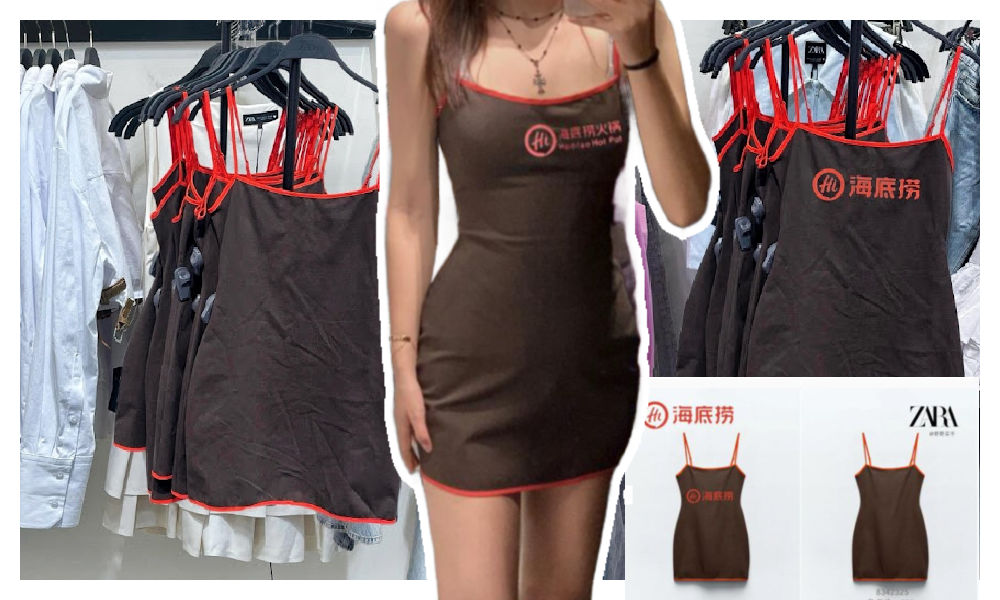
A short dress sold by Zara has gone viral in China for looking like the aprons used by the popular Chinese hotpot chain Haidilao.
“I really thought it was a Zara x Haidialo collab,” some customers commented. Others also agree that the first thing they thought about when seeing the Zara dress was the Haidilao apron.
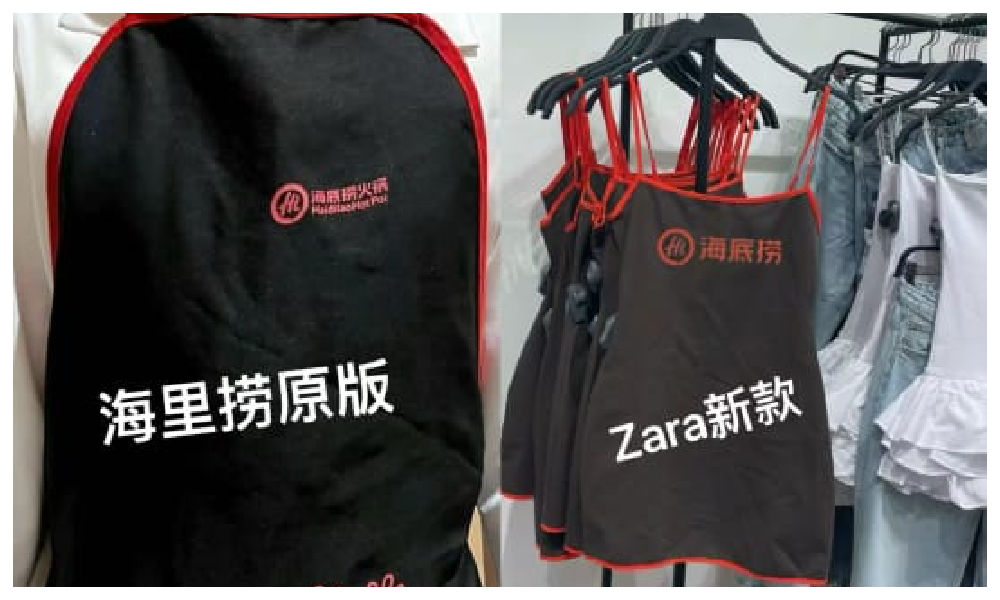
The “original” vs the Zara dress.
The dress has become a popular topic on Xiaohongshu and other social media, where some images show the dress with the Haidilao logo photoshopped on it to emphasize the similarity.

One post on Xiaohongshu discussing the dress, with the caption “Curious about the inspiration behind Zara’s design,” garnered over 28,000 replies.
Haidilao, with its numerous restaurants across China, is renowned for its hospitality and exceptional customer service. Anyone who has ever dined at their restaurants is familiar with the Haidilao apron provided to diners for protecting their clothes from food or oil stains while enjoying hotpot.
These aprons are meant for use during the meal and should be returned to the staff afterward, rather than taken home.
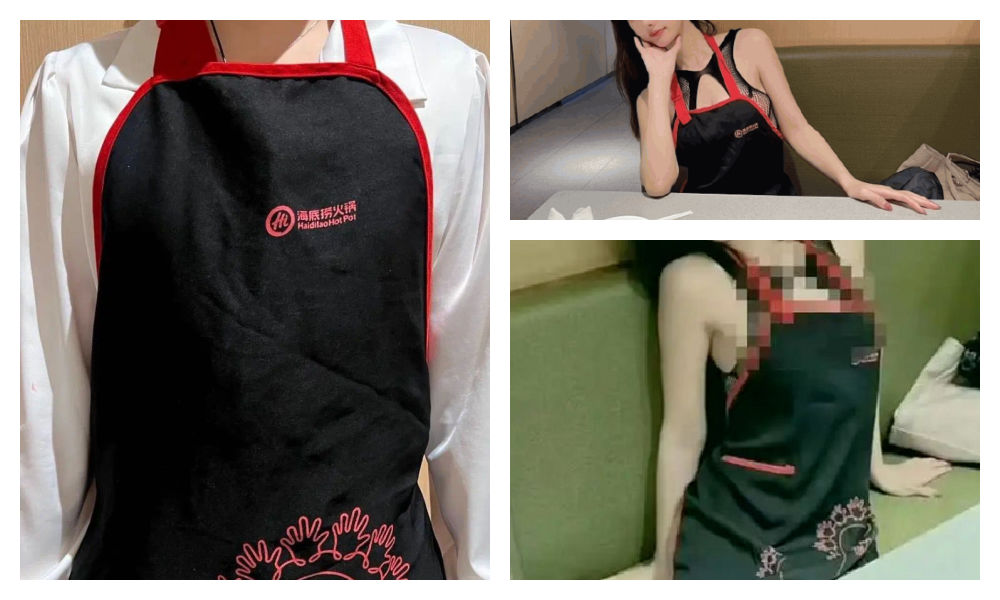
The Haidilao apron.
However, many people who have dined at Haidilao may have encountered the following scenario: after indulging in drinks and hotpot, they realize they are still wearing a Haidilao apron upon leaving the restaurant. Consequently, many hotpot enthusiasts may have an ‘accidental’ Haidilao apron tucked away at home somewhere.
This only adds to the humor of the latest Zara dress looking like the apron. The similarity between the Zara dress and the Haidilao apron is actually so striking, that some people are afraid to be accused of being a thief if they would wear it.
One Weibo commenter wrote: “The most confusing item of this season from Zara has come out. It’s like a Zara x Haidilao collaboration apron… This… I can’t wear it: I’m afraid that someone will say I stole the apron from Haidilao.”

Funnily enough, the Haidilao apron similarity seems to have set off a trend of girls trying on the Zara dress and posting photos of themselves wearing it.
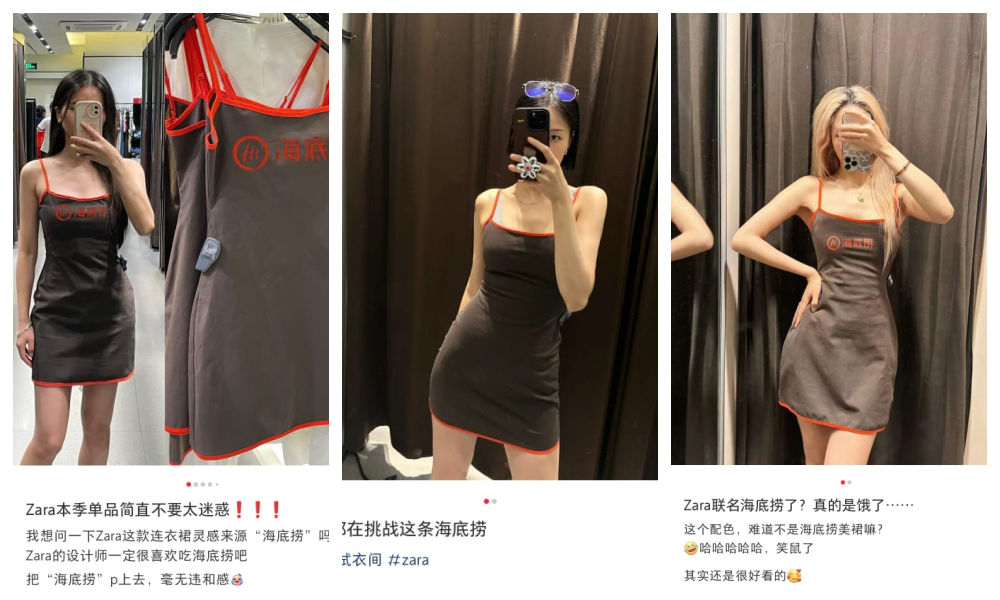
It’s doubtful that they’re actually purchasing the dress. Although some commenters say the dress is not bad, most people associate it too closely with the Haidilao brand: it just makes them hungry for hotpot.
By Manya Koetse
Independently reporting China trends for over a decade. Like what we do? Support us and get the story behind the hashtag by subscribing:
Spotted a mistake or want to add something? Please let us know in comments below or email us. First-time commenters, please be patient – we will have to manually approve your comment before it appears.
©2024 Whatsonweibo. All rights reserved. Do not reproduce our content without permission – you can contact us at info@whatsonweibo.com.
Subscribe

Singing Competition or Patriotic Fight? Hunan TV’s ‘Singer 2024’ Stirs Nationalistic Sentiments

The Tragic Story of “Fat Cat”: How a Chinese Gamer’s Suicide Went Viral

A Brew of Controversy: Lu Xun and LELECHA’s ‘Smoky’ Oolong Tea

Weibo Watch: The Battle for the Bottom Bed

Zara Dress Goes Viral in China for Resemblance to Haidilao Apron

The Tragic Story of “Fat Cat”: How a Chinese Gamer’s Suicide Went Viral

The Chinese Viral TikTok Song Explained (No, It’s Not About Samsung)

The ‘Two Sessions’ Suggestions: Six Proposals Raising Online Discussions

“Old Bull Eating Young Grass”: 86-Year-Old Chinese Painter Fan Zeng Marries 36-Year-Old Xu Meng

Top 9 Chinese Movies to Watch This Spring Festival Holiday

More than Malatang: Tianshui’s Recipe for Success

A Brew of Controversy: Lu Xun and LELECHA’s ‘Smoky’ Oolong Tea

Party Slogan, Weibo Hashtag: “The Next China Will Still Be China”

From Pitch to Politics: About the Messy Messi Affair in Hong Kong (Updated)

Chengdu Disney: The Quirkiest Hotspot in China
Get in touch
Would you like to become a contributor, or do you have any tips or suggestions? Get in touch here!
Popular Reads
-

 China Insight1 week ago
China Insight1 week agoThe Tragic Story of “Fat Cat”: How a Chinese Gamer’s Suicide Went Viral
-

 China Music2 months ago
China Music2 months agoThe Chinese Viral TikTok Song Explained (No, It’s Not About Samsung)
-

 China Insight2 months ago
China Insight2 months agoThe ‘Two Sessions’ Suggestions: Six Proposals Raising Online Discussions
-

 China Arts & Entertainment1 month ago
China Arts & Entertainment1 month ago“Old Bull Eating Young Grass”: 86-Year-Old Chinese Painter Fan Zeng Marries 36-Year-Old Xu Meng




BRIAN LOPEZ
April 29, 2023 at 5:28 am
Man, the nationalism goes deep, no? It’s their own government, not foreign powers. It’s quite sad how easy to manipulate.